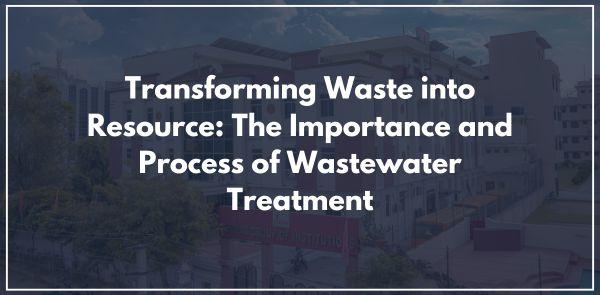
Introduction: Wastewater treatment is a vital process that plays a critical role in protecting public health and the environment. As populations grow and urbanization increases, the volume of wastewater generated continues to rise, highlighting the importance of effective treatment methods. This article explores the significance of wastewater treatment, its process, and the benefits it brings to communities and ecosystems.
Poddar International College, recognized as one of the best colleges in Jaipur, emphasizes holistic development through experiential learning and practical exposure. In line with its commitment to academic excellence, the institution educates students on the significance of wastewater treatment—an essential process for environmental sustainability. By understanding wastewater management, students gain valuable insights into transforming waste into a resource, contributing to sustainable development and public health.
The Importance of Wastewater Treatment: Wastewater, which includes sewage from homes, businesses, and industries, contains various pollutants and contaminants that can pose serious threats to human health and the environment if left untreated. These pollutants may include organic matter, pathogens, nutrients, heavy metals, and chemical compounds. Wastewater treatment is essential for removing these contaminants before the treated water is released back into the environment or reused for other purposes.
The Process of Wastewater Treatment: Wastewater treatment typically involves several stages, each designed to remove specific pollutants and contaminants from the water. The primary treatment process involves physical methods such as screening and sedimentation to remove large solids and debris. Secondary treatment utilizes biological processes, such as activated sludge or trickling filters, to further break down organic matter and remove pathogens. Finally, tertiary treatment, which may include processes like filtration and disinfection, is employed to remove remaining pollutants and ensure the water meets regulatory standards for discharge or reuse.
Benefits of Wastewater Treatment: Effective wastewater treatment brings numerous benefits to society and the environment. Firstly, treated wastewater can be safely discharged into rivers, lakes, and oceans without causing harm to aquatic ecosystems or public health. Additionally, treated wastewater can be reclaimed and reused for non-potable purposes such as irrigation, industrial processes, and groundwater recharge, helping to conserve precious freshwater resources. Moreover, wastewater treatment facilities can recover valuable resources from wastewater, such as nutrients and energy, through processes like nutrient recovery and anaerobic digestion, contributing to resource conservation and sustainability.
Challenges and Future Directions: Despite its importance, wastewater treatment still faces several challenges, including aging infrastructure, inadequate funding, and emerging contaminants such as pharmaceuticals and micro plastics. Addressing these challenges will require investment in infrastructure upgrades, research into advanced treatment technologies, and policies to promote water conservation and pollution prevention. Furthermore, promoting public awareness and engagement in wastewater management and conservation efforts will be crucial for ensuring the long-term sustainability of wastewater treatment systems.
Conclusion: Wastewater treatment is a cornerstone of modern sanitation and environmental protection efforts, playing a vital role in safeguarding public health, preserving water quality, and promoting sustainable development. By investing in wastewater treatment infrastructure, adopting innovative technologies, and promoting responsible water management practices, we can ensure a cleaner, healthier, and more sustainable future for generations to come.

